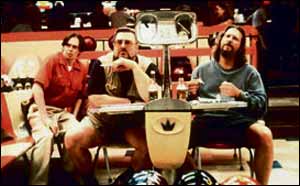|
THE GREATEST EVER JEWISH FILMS I swear that Walter is a great Jewish character | |
I WANTED to begin this column with my favourite Jewish character rather than Jewish film.
That character is Walter Sobchak (John Goodman) in the Coen brothers' masterpiece The Big Lebowski (1998). Walter is a slightly deranged Vietnam veteran and - atypically - a convert to Judaism, having done so for love at the request of his wife - what, in the US, would be called 'a Jew by choice'. Although he has since divorced, he still maintains a level of Jewish Orthodox practice. Walter appreciates, understands and takes his adopted faith very seriously, perhaps more so than many other non-charedi Jews on film. Throughout Walter reaffirms his identity as a Jew and keeps referring to Maimonides (anticipating the Fockers' dog Moses by some years). Walter is proud of his Judaism and does not mind shouting about it. "Three thousand years of beautiful tradition, from Moses to Sandy Koufax . . . You're goddamn right I'm living in the f***ing past!' Walter is also an adept 10-pin bowler. However, when he learns that the next bowling league fixture falls on a Saturday he demands it be changed. In an expletive-ridden speech (containing nine F words and three other racial, sexual and other epithets), he explains that he can't bowl ('roll') or drive on Saturdays because he is 'shomer shabbes' and absolutely refuses to do so unless it is an emergency. He even inserts an F word between 'shomer' and 'shabbes' leading one to wonder if someone who was Sabbath observant would utter it in such a way. At the same time, Walter is a superficially unattractive figure, both physically and mentally. He is overweight, close to unhinged and prone to profuse profanity. The F word is used 260 times in the film, a significant proportion of them uttered by Walter. He is sturdily built, has a 'crew cut' hairstyle and shirts, combat jacket, waistcoats, haircut and aviator sunglasses that evoke a style appropriate for an army man - practical, durable and comfortable. Walter's stint in Vietnam has instilled in him a desire for precise rules and regulations. His adopted Judaism and bowling become a replacement for the regimentation of his much-missed army life. But in the final analysis he is a mensch. His hesped to his friend Donny is a moving tribute showing how he cared deeply for him, as he does for his companion, the Dude, a fact acknowledged in the warm embrace they share after Walter has accidentally emptied Donny's ashes (irreverently contained in a Folger's coffee tin) into the Dude's face. Walter, therefore, is a complete reversal of the previous cinematic characterisations of the Jew - often no more than ciphers or stereotypes - if not an outright and deliberate satire and mockery of them. The embodiment of such characterisations can be found in Fiddler on the Roof's cute, cuddly, kitsch, aphorism-spouting protagonist Tevye (Topol). So when Walter declares 'I'm as Jewish as f****n' Tevye!', the irony here is that size and beard apart, he couldn't be further from this product of a fantasised, Americanised image of shtetl-dwelling Jewry, that represents the assimilatory, placatory past. In this way, the Coens use Walter to mock the assimilatory strategies of the 1950s in which the Jewish movie moguls removed any trace of Jewishness that they could from their screens. The Big Lebowski is also a damn fine film noir and movie about bowling. Nathan Abrams is a senior lecturer in film studies at Bangor University and is the author of The New Jew in Film: Exploring Jewishness and Judaism in Contemporary Cinema (IB Tauris, 2012).
|
 BOWLED OVER: Steve Buscemi (Theodore Donald 'Donny' Kerabatsos), John Goodman (Walter Sobchak) and Jeff Bridges (Jeffrey 'The Dude' Lebowski) in The Big Lebowski
BOWLED OVER: Steve Buscemi (Theodore Donald 'Donny' Kerabatsos), John Goodman (Walter Sobchak) and Jeff Bridges (Jeffrey 'The Dude' Lebowski) in The Big Lebowski